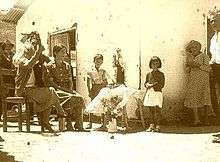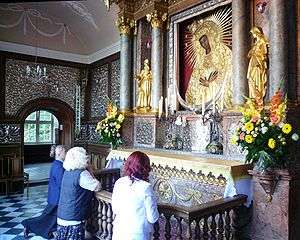Novena


A novena (from Latin: Novem, meaning Nine) is an act of pious Roman Catholic devotion[1] often consisting of private or public prayers repeated for nine successive days in belief of obtaining special intercessory graces.[2]
The recitation of novena prayers are primarily found in the Roman Catholic Church,[1] while some members of the Anglican Church, Eastern Orthodox Church and Lutheran Church also share in an effort for church renewal.
The prayers are often derived from devotional prayer books, or consist of the recitation of the rosary (a "rosary novena"), or of short prayers through the day. Novena prayers are customarily printed in small booklets, and the novena is often dedicated to a specific angel, saint, a specific Marian title of the Blessed Virgin Mary, or it invokes one of the personages of the Holy Trinity.
Within the Roman Catholic discipline, novena prayers for public use must have an Imprimatur, Nihil Obstat, and Imprimi potest. These ecclesiastical sanctions are usually granted by a bishop or any ranking prelate for publication and approval.
History

The practice of the novena may have been influenced from the Medieval practice of holding daily Mass for nine consecutive days for recently departed members of the upper classes and clergy. Probable theories of the medieval practice may trace its origins to an early Greek and Roman custom performed by families, consisting of nine days of mourning after the death of a loved one, followed by a feast, which originally prompted Catholic writers such as Saint Augustine of Hippo, Pseudo-Alcuin and John Beleth to warn Christians not to emulate the custom.[3]
Over time, members of Roman Catholic faith began to place less emphasis on the number nine's connection to the pagan custom, and more on its association with the nine months Jesus spent in the womb, the giving up of His spirit at the ninth hour, and the event which occurred in the Upper Room with Twelve Apostles and the Blessed Virgin Mary when they prayed for nine days until the Holy Spirit descended on the Feast of the Pentecost.
In the New Testament, this biblical event is often quoted from Acts of the Apostles, 1:12 – 2:5. The Church Fathers also assigned special meaning to the number nine, seeing it as symbolic of imperfect man turning to God in prayer (due to its proximity with the number ten, symbolic of perfection and God).[3] These developments first affected Christian mortuary celebrations, and then carried over to prayer. The practice of saying novenas may be derived from Holy Scripture or simply the development of both Roman practice integrated into biblical events found in scripture.
Categories

In the Roman Catholic Church, there are four recognized categories of novenas which belong to more than one of these categories:[3]
- Mourning, or in anticipation of a Burial
- In anticipation of a Church Feast or ending in Vespers (often requires Church attendance)
- Individual or Group Petition (Expiatory)
- Indulgence for the remission of Sins (often requires Sacrament of Confession or Church attendance)
By standard liturgical norms, novenas are performed in church, at home, or anywhere where solemn prayers are appropriate, though some indulgenced novenas require church attendance. Sometimes, a special candle or incense is lit at the beginning of the novena which burns during the nine days of prayer. The first chapter of the General Principles of Sacrosanctum Concilium, number #13 is often cited as a guideline regarding the implementations of public novenas.[4][5]
Other denominations
Novena prayers are also practised by Lutheran, Orthodox and Anglican Christians, who hold close or similar beliefs regarding its pious practice. In addition, novenas have also been used in an ecumenical Christian context, such as those promulgated by Premier Christian Radio, in order to pray for Church renewal.[1]
See also
- Marian devotions – Miraculous Medal novena
- Novenas in anticipation of Christmas: Las Posadas, Simbang Gabi, Novena of aguinaldos
- Novena of Grace
- Novena to Our Mother of Perpetual Help
References
- 1 2 3 "Novena: nine days of prayer with Premier". Premier Christian Radio. Retrieved 10 April 2015.
Novena is an ancient tradition of prayer for nine days between Ascension Day and Pentecost Sunday. Premier is resourcing a Novena to invite the Holy Spirit to bring fresh renewal to the Church and calls on churches across the UK to take part in an ecumenical act of unity and prayer.
- ↑ "Novenas" at EWTN
- 1 2 3 Hilgers, Joseph. "Novena." The Catholic Encyclopedia. Vol. 11. New York: Robert Appleton Company, 1911. 20 Dec. 2012
- ↑ SacroSanctum Concillium. Chapter 1: Number: XIII. http://www.vatican.va/archive/hist_councils/ii_vatican_council/documents/vat-ii_const_19631204_sacrosanctum-concilium_en.html
- ↑ Novena to Our Mother of Perpetual Help - Baclaran copy. with Imprimatur.
Bibliography
- Right Reverend Monsignor Joseph F. Stedman, The New Revised 'Triple' Novena Manual, Confraternity of the Precious Blood, 1975.
- Barbara Calamari & Sandra DiPasqua, Novena, Penguin Studio, 1999. ISBN 0-670-88444-8.
External links
- List of Novenas at EWTN
- "Novena for the repose of the soul of John Paul II", United States Conference of Catholic Bishops (USCCB)
|
